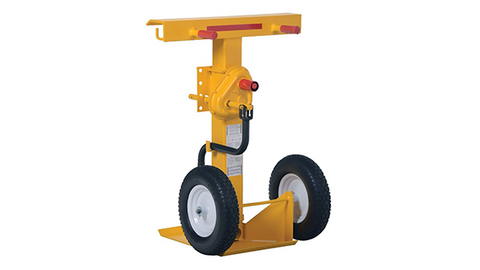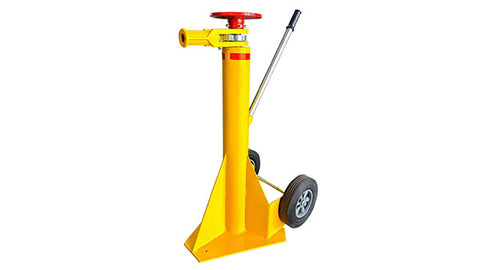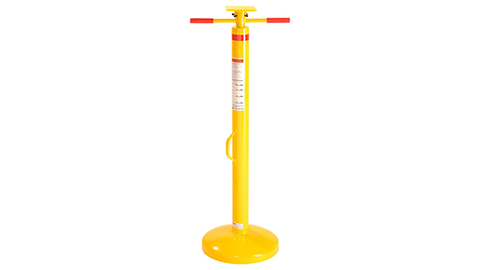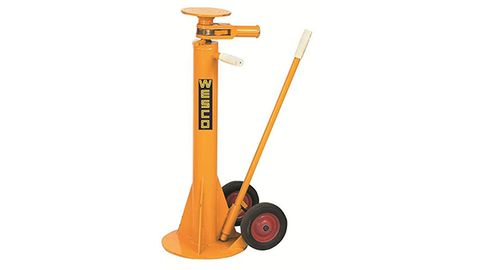Trailer jacks are pivotal elements in the realm of trailers. They aid in hitching, unhitching, and delivering stability. Without an apt trailer jack, the safety and convenience of using your trailer wane. In this expansive guide, delve into the various types, their applications, how to select the ideal one, and indispensable maintenance pointers.
The Different Types of Trailer Jacks
A-Frame Jacks
A staple in the world of towing, A-Frame jacks are so-named because of their attachment to A-frame trailers, forming an "A" shape with the trailer itself. These jacks are incredibly durable, bolting directly onto the trailer's frame for added stability. Because of their robust nature, they're ideal for medium-weight trailers such as RVs, horse trailers, and sizable utility trailers. If you've got a trailer with a pointed front (akin to the letter A), this jack is likely your best bet.
Side-Wind Jacks
Side-wind jacks distinguish themselves with a handle that projects sideways. Their design makes them a favorite among users who require quick and straightforward jack access. While these jacks can support a range of trailer weights, they're particularly handy for utility trailers and other compact trailer configurations due to their ergonomic design.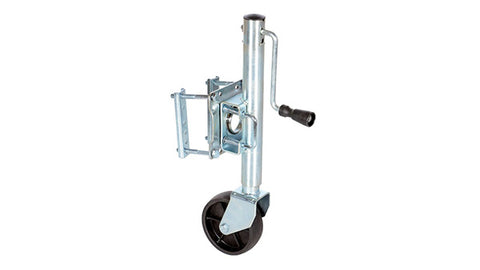
Top-Wind Jacks
Offering a unique solution for spaces that may be cramped on the sides, top-wind jacks come with a handle located on the top. This design ensures that the user doesn't face obstacles when cranking the jack, especially when there's limited side clearance. If your parking or storage space is tight on the sides but open from the top, consider this jack.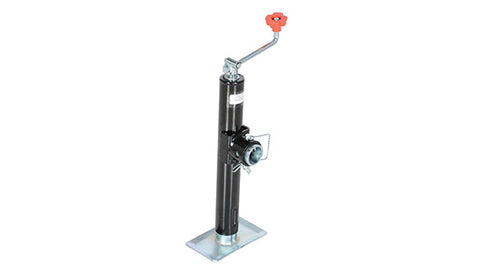
Pneumatic Jacks
Pneumatic jacks offer a blend of power and precision. Operated by air pressure, they provide a smooth and consistent lifting mechanism, which is why they're a favorite in industrial settings or heavy-duty applications. If you're dealing with extremely heavy loads and need a reliable, robust jack, the pneumatic variant is the one to consider.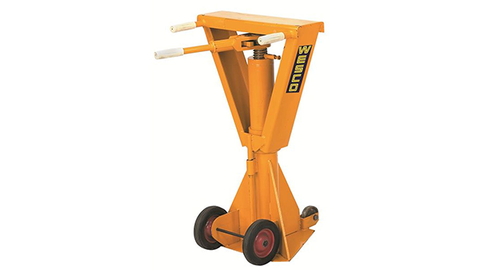
How to Choose the Right Trailer Jack for Your Needs
When on the hunt for the perfect trailer jack, weigh in on:
- The jack's capacity to handle your trailer's weight.
- Mounting options like A-frame, weld-on, and bolt-on.
- The required lifting height.
- Usability factors: manual vs. electric.
- The need for weather-resistant materials in harsh conditions.
Our Recommendations
When it comes to trailer jacks, reliability and capacity are paramount. Here are two top picks that cater to various requirements without compromising on quality:
- Capacity: An astounding 100,000 lb, making it ideal for the heaviest of trailers and loads.
- Features: Besides its high capacity, its ratchet mechanism ensures easy and efficient lifting and lowering. Perfect for those who are looking for a seamless operation and safety.
- Capacity: 50,000 Lb. Static Capacity, offering a balance between strength and economy.
- Features: Tailored for those who require substantial support without the bells and whistles. It provides a stable base for trailers, ensuring they remain stationary when parked.
Both of these options are suitable for heavy-duty applications, and your choice ultimately depends on your specific needs and budget constraints. Invest in the right tool for the job and ensure the safety and efficiency of your operations.
Proper Use of a Trailer Jack
Safety should always be paramount. Ensure the trailer is stationed on a level spot and the wheels are chocked. For those with manual jacks, maintaining a smooth and regular cranking rhythm is key. If you have an electric jack, be acquainted with its controls and steer clear of overloading.
Maintenance and Troubleshooting
A routine visual inspection can flag visible damages, warped parts, or corrosion. Lubricating moving components extends their life and enhances performance. Regular cleaning keeps dirt and muck at bay. When storing, aim for an indoor space or at the very least, use a protective cover. Common issues users grapple with include the jack's refusal to raise or lower, noisy operations, and malfunctioning electric jacks.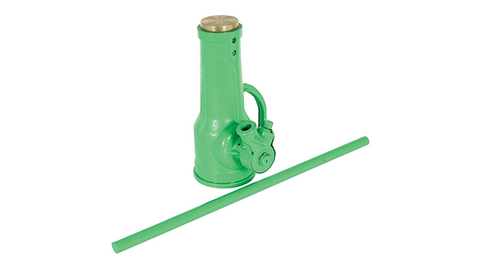
Conclusion
Being informed and vigilant about your trailer jack's selection and maintenance is imperative for ensuring safety and top-notch performance. Always ascertain that your jack is in prime condition and aligns with your trailer's requisites.
FAQs
Q: Which brands roll out reliable trailer jacks?
A: Some esteemed names in the industry include Vestil, Titan Lifts, Wesco, and Source 4 Industries.
Q: Where can I unearth more data on warehouse supplies and material handling solutions?
A: Source 4 Industries stands as a premier supplier brimming with in-depth articles and insights.
Q: How often should I maintain or inspect my trailer jack?
A: Inspect before each use; perform thorough maintenance annually or as the manufacturer advises.
Q: Can I use a trailer jack for applications other than trailers?
A: They're designed mainly for trailers. Using them otherwise is not recommended.
Q: Are there specific safety precautions when using a trailer jack?
A: Ensure a level, stable ground, position the jack correctly, stay within its capacity, and use jack stands if working underneath.
For a deeper dive into material handling, visit the articles section at Source 4 Industries.
In wrapping up, this guide aims to furnish you with a solid grasp of trailer jacks, ensuring you're well-equipped for all trailering tasks.


